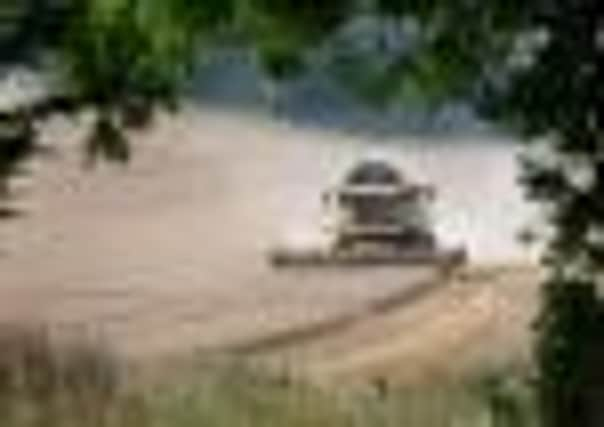Farmers looking to brighter future


A survey of confidence among members of the National Farmers’ Union has revealed overall faith in the industry’s future from farmers is on the up, with many saying they will be looking to increase production in the next five years.
An increase in profits was reported by around 20 per cent of farming businesses, compared with 13 per cent in last year’s survey.
Advertisement
Hide AdAdvertisement
Hide AdHowever it was not good news across the board with the picture for many producers still remaining very precarious.
The union said that while the results showed a “quiet confidence” among many farmers, it also warned that nearly half had reported a decline in earnings.
Almost one in three farmers said they expected things to decline for their business in the near future with a large proportion of those farmers questioned responding that they are still seeing profits decline.
Just under 30 per cent reported a worsening situation or fears about their business’ survival with dairy predictably proving to be one of the worst affected sectors.
Advertisement
Hide AdAdvertisement
Hide AdIn total 42 per cent have reported a decline in their bottom line and concerns about the businesses’ long-term survival this year, up from 25 per cent in 2010.
The NFU’s director of policy, Martin Haworth, said: “As ever reporting on farming fortunes is a mixed bag with overall confidence on the increase while some sectors remain hard pressed.
“The results from the dairy sector are not surprising and validate NFU calls for the recent rises seen in the milk price to be shared across the supply chain.
“Currently only 9.6 per cent of dairy farmers are seeing a positive impact on their bottom line.
Advertisement
Hide AdAdvertisement
Hide Ad“The fact UK dairy farmers are languishing around the bottom of the EU milk price league table is lamentable and efforts to agree an industry voluntary code of best practice for contracts need to be doubled to safeguard the future for many British dairy farmers.
“For every sector price clearly has a strong influence on farmer confidence.
“In a sector where profitability has been historically low, such as across the beef and sheep industry, the survey points to rising confidence but it’s undoubtedly linked to headline prices and profitability expectations shows that confidence remains fragile.”
Despite some of the figures continuing to show problems within the farming industry, Mr Haworth sought to sound a note of optimism, saying: “It is encouraging to see that across the board 50 per cent of farmers are looking to increase production in the next five years, up from 35 per cent last year.
Advertisement
Hide AdAdvertisement
Hide Ad“This is a clear signal that farmers are looking to invest in their business for the long-term.
“This is mirrored by plans from around 62 per cent of farmers looking to invest the same or more in buildings and more than 70 per cent recognising the need to invest more or the same in skills and training for their farm.
“Key factors on the horizon keep me optimistic about the future.
“We will see a growing global population and a need to produce more food while safeguarding the environment, and for that British farmers are well-placed to deliver.”
Advertisement
Hide AdAdvertisement
Hide AdThe NFU’s report is published just days after new statistics from Defra showed that confidence among the organic farmers was continuing to decline in the face of falling sales.
The number of farmers converting to organic production has been declining for some years now but new Defra figures showed that the amount of organic farmers fell by four per cent last year to just over 7,000.
Perhaps most worryingly for the sector, however, was the news the amount of land being converted to organic production was now just 51,000 hectares throughout the whole country, less than half of the 2009 figure.
The total amount of land used for producing organic food also declined, falling three per cent during 2010 to 718,000 hectares.
Advertisement
Hide AdAdvertisement
Hide AdThe hecterage of organic cereals decreased by five per cent to 57,000, something Defra said may reflect falling organic grain prices towards the end of 2009.
In Yorkshire, organic farmland accounts for just 1.4 per cent of the region’s total agricultural area and just 302 of its farmers, down from a total of 356 in 2007.
The amount of poultry, pigs and vegetables being produced organically have all fallen too. Britain’s leading organic group the Soil Association admitted it was a worry.
Meanwhile Britain’s entire farming community will be looking ahead to next month’s British Food Fortnight to bring much needed boosts to their income.
Advertisement
Hide AdAdvertisement
Hide AdRunning between September 17 and October 2, it will involve thousands of activities across the country including food and drink festivals, promotions, tastings and special menus in pubs, restaurants and shops.